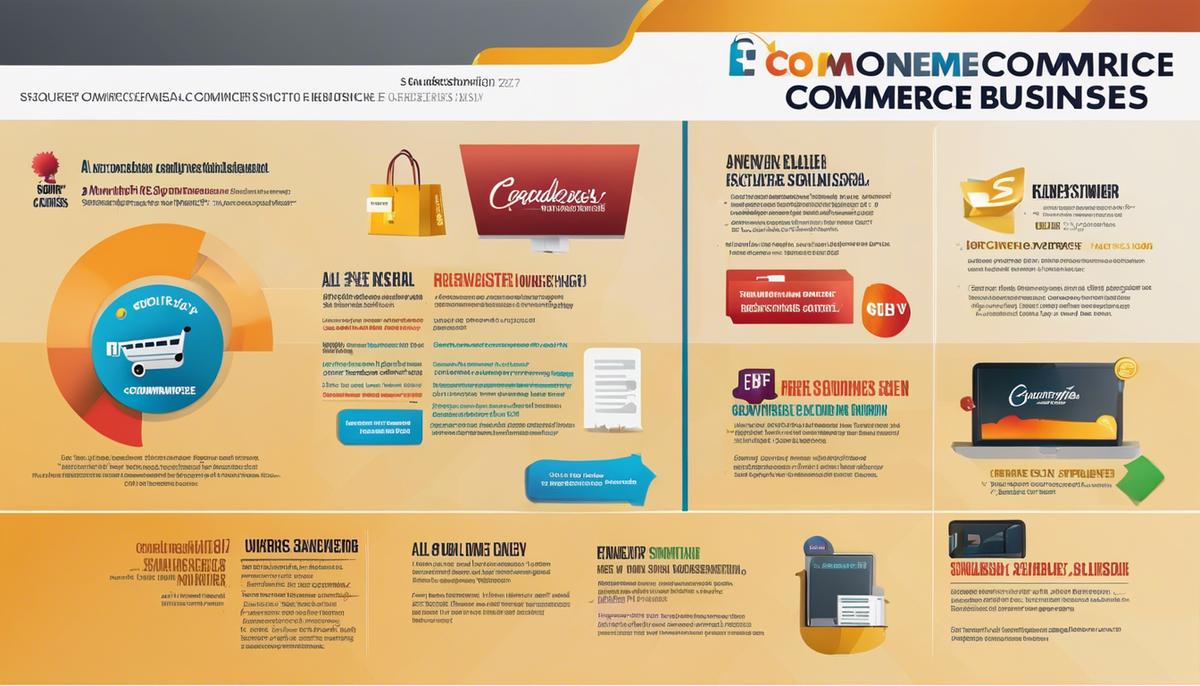In today’s digital age, the capacity to buy and sell products or services online, commonly known as e-commerce, has revolutionized the way businesses operate and consumers shop. Establishing an e-commerce business can be a rewarding journey, holding the potential for significant financial growth and global reach. This journey, however, is a complex path navigated successfully only with a thorough understanding of vital elements such as business models, market opportunities, innovative offerings, robust marketing strategies, and the complex terrain of legal and financial obligations. This comprehensive enlightening analysis is designed to demystify the critical aspects of launching a successful e-commerce business.
Defining Your E-commerce Business Model
The digital revolution has indisputably influenced the way businesses operate particularly, the adoption of E-commerce. Right now, the E-commerce industry is rapidly expanding, and its growth opportunities are limitless. For businesses and entrepreneurs eyeing this growth curve, it’s essential to comprehend the key elements necessary in building a successful E-commerce business from scratch.
The E-commerce market is an innovative and fast-paced industry, which means having a clear direction and robust plan is essential. The first order of business is to streamline your ideas and create a business plan. This should detail your target market, cost estimates, anticipated profit margins, and competitive analysis. A solid business plan provides a detailed roadmap, guiding you through the steps of business growth and development.
Building a user-friendly and robust E-commerce platform is non-negotiable. This entails investing heavily in technology that can support a seamless shopping experience for your clients. Your website should be intuitive, responsive, and easy to navigate. Additionally, ensuring your website is mobile-friendly is crucial as more and more consumers are opting for mobile shopping.
Customer experience reigns supreme in E-commerce. Strive for excellence in every customer interaction by offering top-notch customer service and providing quality products. Moreover, a simple and secure transaction process can seal the deal for customer conversion and retention.
A successful E-commerce business understands the power of data. Harnessing data analytics will provide insights into your customer’s behavior, preferences, and purchasing patterns. This knowledge can be utilized to personalize your offers and enhance customer engagement.
Your marketing strategy can make or break your E-commerce business. Hence, employing effective marketing strategies is paramount. This includes SEO, content marketing, social media marketing, and pay-per-click advertising, and influencer marketing. The goal is to increase your online visibility and draw more traffic to your website.
Additionally, catering to global audiences through cross-border E-commerce can significantly expand your business reach. This involves understanding and respecting the diverse cultures, preferences, and regulations of different geographic locations.
Last but not least, building trust is vital in the E-commerce sphere. Trust can be cultivated by having strong cybersecurity measures that protect customer data and by offering secure payment solutions. Also, maintaining transparency in your business practices will strengthen customer confidence in your brand.
There you have it! Key elements to consider in building an E-commerce business from the ground up. While the E-commerce landscape can be unpredictable and highly competitive, thoughtful planning and execution of these components can pave the way for a truly profitable and sustainable E-commerce business. Remember, success might not come overnight, but with perseverance, adaptability, and a customer-centric approach – it will come.

Identifying Market Opportunities for E-commerce
Dominating the E-Commerce Landscape: Uncovering Unseen Opportunities
Exploiting lucrative opportunities within the fierce e-commerce landscape is tantamount to striking gold in a mine diverse with gems. Yet few entrepreneurs hone in on their ability to not only identify but also seize these golden opportunities. The key? Engaging in diligent market research and capitalizing on emerging technologies, trends, and practices.
Ecommerce, like any marketplace, is contingent upon the basic economic principle of supply and demand. One of the most potent tools at an entrepreneur’s disposal is the understanding and monitoring of these patterns. They must delve into the heart of the market scene, identifying consumer needs, preferences, and purchasing patterns. Harnessing this knowledge allows businesses to offer products and services that not only fulfill an existing market demand but potentially unveil unrealized necessities, creating fresh demand.
Yet, this isn’t a static process. The e-commerce ecosystem is in continual flux, rapidly evolving due to technological advancements and shifting consumer needs. Remaining limber, constantly advocating for innovation, is an entrepreneur’s secret weapon. Pioneering the integration of Artificial Intelligence (AI) and Machine Learning technology into processes such as inventory management or customer service is an example. This allows for streamlining and automating tasks and baring rich insights, all while potentially identifying untapped consumer needs.
An entrepreneur also must be prepared for gauging and riding the wave of emerging trends. For example, sustainability is a trend dynamically growing in momentum. Businesses catering to these evolving consumer values unlock competitive advantage, hitting two birds with one stone by adopting responsible practices and taking ethical routes that resonate with target audiences.
Innovation shouldn’t solely lie within the products or services offered but must extend to delivery methods as well. Fast and flexible delivery options, seen in businesses such as Amazon, offer a unique edge and act as a key differentiator in a saturated e-commerce market. By extending services to innovative delivery solutions like drones or in-car delivery options, entrepreneurs could unveil a new realm of opportunities.
Moreover, focusing on underpenetrated markets and demographics can serve as a niche strategy entrepreneurs might want to consider. Strategic alliances and partnerships could offer growth opportunities to increase market share and enter new markets more efficiently.
Lastly, societal networking is invaluable in the e-commerce realm. Active social media engagement can help an entrepreneur connect with their audience on a personal level, leading to increased brand loyalty and providing an avenue to discover latent industry trends and opportunities.
Summing up, it’s quintessential for entrepreneurs in the e-commerce sector to remain nimble, while continually seeking innovation and new market trends. Intuitive understanding of customer behavior, embracing emerging technologies, riding the wave of societal trends and social networking lay the groundwork for being able to identify and seize market opportunities in this dynamic industry. There is no one-size-fits-all policy, but the key to flourishing in this battleground lies in constant evolution in tune with the marketplace’s rhythm.

Innovating Products and Services in E-commerce
Innovation – the spark of a pioneering idea or the reworking of a common practice – can lay the foundation for a unique e-commerce value proposition. Progressively, it becomes crucial for enterprises to construct their business strategies around innovation. It is the bedrock of differentiation – providing unmatchable value to the customers, captivating their attention, and locking in their loyalty.
Comprehending the market patterns and the customer needs prevalent in the e-commerce sphere is paramount. To sculpt an outstanding proposition, businesses must decipher consumers’ evolving preferences, aspirations, and pain points. This understanding enables companies to ascertain, tailor, and deliver the unique value they seek. Pinpointing these customer needs and successfully addressing them sets a venture apart on the e-commerce battleground.
Adding to their arsenal, businesses can adopt and leverage emerging technologies and trends. Blockchain, Internet of Things (IoT), Augmented Reality (AR), are a few innovations that can revolutionize an e-commerce enterprise. These technologies can spur efficiencies, enhance user experience, and create unparalleled value, instigating a dominant market presence.
The incorporation of Artificial Intelligence (AI) and Machine Learning can unlock efficiencies unheard of. AI can power systems that morph based on consumer interaction. Chatbots, recommendation engines, and predictive analysis make every interaction personalized, building a unique customer journey, and fostering engagement.
E-commerce businesses must cast an analytical eye on emerging trends such as sustainability – a mantra that’s resonating with consumers globally. Offering ‘green’ products or going the ‘sustainable delivery’ route could be the game-changer, setting the business apart from the competition and meeting the values of a significant demographic.
Moreover, innovating delivery methods can influence not just customer satisfaction but carve a unique value proposition. From drones and robots to crowd-sourced delivery, out-of-the-box methods signal cutting-edge culture, excitement, and can trigger viral publicity.
Focusing on under-penetrated markets and overlooked demographics presents untapped opportunities. Companies can use innovation to cater uniquely to these populations, crafting a niche that few competitors address and establishing unrivaled offerings.
Leveraging strategic alliances and partnerships can spur exponential growth and market expansion. Aligning with brands possessing complementary strengths can escalate offerings, consolidate market standing, and expand customer reach.
Never underestimate the power of social media in e-commerce. Businesses can innovatively harness it to instigate engagement, create brand ambassadors and even discover industry trends. User-generated content, influencer collaborations, or social causes – the avenues for innovation are many and varied in the digital universe.
Innovation, represented in myriad forms, is an indispensable tool for e-commerce businesses seeking an inimitable value proposition. It requires businesses to understand, adapt, and incorporate trends, technologies, niches, partnerships, and consumer behavior, all while fostering a culture of continuous innovation. A homogenous e-commerce market demands differentiation: and therein lies the game of innovation. So let’s play.

Building a Robust E-commerce Marketing Strategy
E-commerce startups have a unique way of revolutionizing the way consumers purchase, giving plenty of opportunities for innovation. To keep pace with this dynamic sector, understanding market patterns and consumer needs is paramount. You need to monitor changing consumer habits, emerging technologies, and undergo a periodic SWOT analysis of your business to carve out niches and direct resources more effectively.
Staying at the forefront of technological advancements can provide an edge against your competitors. Adopting emerging technologies such as blockchain for secure transactions, IoT for data collection, and augmented reality for product visualization, can offer a more immersive user experience.
Simultaneously, the incorporation of artificial intelligence and machine learning can streamline various aspects of the business. AI and machine learning can assist in everything from managing inventory to customer behavior analysis, offering predictive insights that allow for smart decision-making.
Next, regard sustainability as more than just a buzzword. Modern consumers are socially conscious and demand ethical practices from the businesses they associate with. Focusing on sustainability in your operations, supply chain management, and packaging can enhance your brand appeal and drive customer loyalty.
Just as critical is redefining and innovating delivery methods. Unique and flexible delivery options, such as same-day delivery, subscription services, or in-store pickups, can make your E-commerce venture stand out and boost customer satisfaction.
Consider focusing on under-penetrated markets and overlooked demographics. Niche strategy in E-commerce can prove highly rewarding, given that larger players might not cater to specific, smaller markets effectively.
Leveraging strategic alliances and partnerships offers a relatively fast route to growth and market expansion. These collaborations can help your startup scale quickly, drive innovation, share resources, and gain access to new customer bases.
Harness the power of social media not just for marketing, but also for customer service and product development. A strong social media presence helps increase your brand visibility, build loyal customer bases, and uncover valuable insights on industry trends.
To be successful in the E-commerce landscape, the overarching principle must be continuous innovation. The E-commerce industry is evolving at an exponential rate, making it imperative to be innovative and adapt frequently. From strategies and tech implementations to partnership selection and customer service, an innovative approach will ensure your E-commerce startup thrives even in the most saturated markets.
This entrepreneurial journey demands resilience, foresight, strategic partnerships, and a relentless focus on the customer. Embrace these strategic considerations for your E-commerce startup and you’re poised to disrupt the industry with your innovative service and product offerings.

Understanding E-commerce Business Legal and Financial Matters
Treading the Legal Landscape
As in any venture, understanding the legal terrain is paramount in launching an e-commerce business. Few entrepreneurs relish the prospect of wrestling with legal jargon and intricate legislature, but failure to acquaint oneself may lead to irreversible, expensive blunders. Compliance with laws including data privacy, intellectual property rights, sales tax, and consumer rights isn’t negotiable – it’s vital. Companies must maintain meticulous records and adhere to stringent regulations to avoid costly litigation.
Legal advice isn’t a luxury but a necessity, establishing clear terms, conditions, and privacy policies to safeguard the business and its customers. The importance of these legalities transcends borders. For instance, European customers come under GDPR protection, requiring explicit business alignment with data regulations.
Escalating Your Business with Financial Management
Investing in your e-commerce venture without a solid financial plan is akin to setting sail in stormy weather without a compass. The financial infrastructure, accounting processes, and capital management can make or break the business.
Efficient financial management begins with understanding costs. Entrepreneurs should factor in both initial expenses like website development and recurring costs like hosting, maintenance, digital marketing, and inventory procurement. Beyond these operational costs, understanding the tax implications, having a robust bookkeeping system, and factoring in payment gateway fees is crucial.
Payments and gateway providers, too, play crucial roles here. Given their global reach, e-commerce businesses must strive to offer a range of payment options, embracing the rise of digital and mobile payments. Such financial agility not only enhances customer experience but also helps tap into wider markets.
Additionally, financial analysis tools can help identify product profitability, cost-effective marketing channels, and underserved customer segments. Consequently, these insights can drive strategic planning and resource allocation.
Seeking and Securing Funding Opportunities
Another essential aspect to consider is accelerator programs and seed capital, often needed to fuel startup growth. Entrepreneurs might need to approach angel investors, venture capitalists, or crowdfund to acquire the necessary financial backup. While exciting, these interactions necessitate a financial forecast, profit projections, business valuations, and an understanding of equity dilution.
Persisting Challenges and Opportunities in E-commerce
Regulation in the world of e-commerce is seamless and quicksilver. This regulatory fluidity offers both challenges and opportunities. Savvy entrepreneurs will be those who stay not only compliant with current regulations but also adaptive to future regulatory shifts.
Additionally, they’ll leverage financial management as a pacesetter and growth catalyst for their business. With meticulous bookkeeping, robust financial planning, and strategic funding endeavors, an e-commerce venture can turn from a promising idea to a thriving reality.
The blend of operational finesse, technological acumen, and financial prowess can dictate the eventual success of any e-commerce venture. As in all business stories, the winners of the e-commerce age will be defined by their ability to adapt, innovate, and navigate the intricate worlds of law and finance.

Establishing a successful e-commerce venture is much more than simply setting up an online shop. It’s about tailoring the right business model, identifying and capitalizing on market opportunities, consistently providing innovative products or services, and constructing an expansive marketing strategy. Adding to this are the legal and financial intricacies uniquely intertwined with running an e-commerce business. With a comprehensive understanding of these factors, a start-up can thrive in the limitless and dynamic e-commerce world. This discourse aimed to provide that understanding, giving rise to successful e-commerce entrepreneurs empowered with knowledge, foresight, and strategic finesse.
